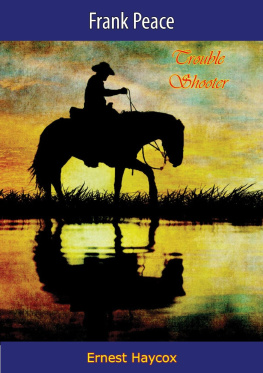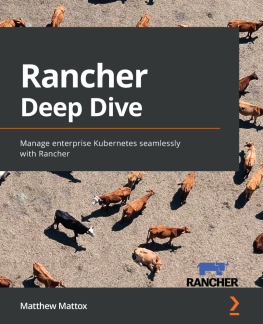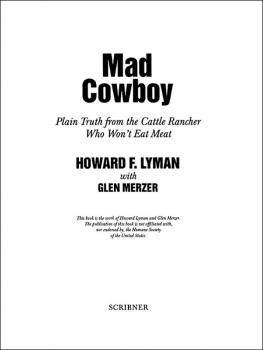This edition is published by BORODINO BOOKS www.pp-publishing.com
To join our mailing list for new titles or for issues with our books borodinobooks@gmail.com
Or on Facebook
Text originally published in 1936 under the same title.
Borodino Books 2017, all rights reserved. No part of this publication may be reproduced, stored in a retrieval system or transmitted by any means, electrical, mechanical or otherwise without the written permission of the copyright holder.
Publishers Note
Although in most cases we have retained the Authors original spelling and grammar to authentically reproduce the work of the Author and the original intent of such material, some additional notes and clarifications have been added for the modern readers benefit.
We have also made every effort to include all maps and illustrations of the original edition the limitations of formatting do not allow of including larger maps, we will upload as many of these maps as possible.
TRAIL SMOKE
by
ERNEST HAYCOX
FIGHT TO THE FINISH
They dropped their gun belts to fight it out another way. Buck Surratt knew his adversary had the strength of a rock-crusher. There was immense power in those ropy shoulder muscles, the girth of his neck, those thick wrists and fists, giving his arms the look of heavy-knobbed clubs. And yet Surratt goaded him, and so Bill Head threw himself across the room toward him. Surratts mind told him he had made another mistake. Head slammed terrifically into him and threw him against the wall. His skull struck the boards, his brain roared. Heads fists were like axes chopping into his temples, driving daylight and memory out of him. Strength left his legs entirely, and thus blinded and stunned and momentarily helpless, he reached for Heads waist and caught it to weather the storm
But that wasnt to be the end of it
Chapter OneMAN ALONE
Forty hours of steady riding brought Buck Surratt across the wide desert to these foothills. The road at once left this burning plain and followed a canyons rising tangents into broken masses of ravine and butte and deep green sweeps of pine. Far away and high up the Gray Bull peaks reared their stony shoulders.
A long training in trouble turned him aside from that canyon road. Bearing to the left, he climbed the ridge and reached its summit and there, with the invitation of the pines directly ahead of him, he paused to scan his back trail. His high, flat body became still and all the restlessness of his nature flowed into a hard, prolonged attention. The sun had dipped against the western horizon, and its edge seemed to burst and spill a golden lava across the earth; that final light laid a clear flame on the far mountains over there. Emptiness and a smoky heat haze filled the flat, tawny desert lying between. Buck Surratts glance explored every detail of it, the whole picture engraving itself on his retentive memory. Afterwards his eyes turned to the green tangle of the hills. Up there was coolness and isolationand anonymity for a man. And because these were the things he sought beyond all other things, he lifted his reins gladly and passed into the timber.
At dark he sat on his heels with a pipe clenched between his teeth, watching the livid coals of his campfire burn a ruby hole through the felted shadows of the forest. Water ran sibilantly along the bottom of a ravine on his left; a damp, earthy smell rose from that black depth. The voice of the forest and its mysteries pulsed around him, softened by a small cool wind flowing off the Gray Bull peaks. Out of this deep solitude came the airborne call of wildness, intangible, yet striking definitely through him. His shoulders swayed a little, he cocked his head to listen, and the pressure around the corners of his long lips relaxed and smoothed away the taut, dry bitterness that had so long been there. The firelight struck up a bright flash in his eyes. A windless chuckle disturbed his chest and his inscrutable, sun-darkened cheeks broke to a faint smiling. He was still smiling when he rolled the blankets around him and fell asleep, the presence of that wild mystery invoking a swift response in his wire-tough body. It eased and nourished him, though he did not know why. There was some ancient familiarity here he didnt understand. The last thing he heard was the patient stir of the pony around its picket rope.
The shot ripped a ragged hole through the stillness, its sound near enough to strike physically against him. Wakened, he remained a motionless moment in his blankets, keen to the possibilities of the night, hearing the echoes of the shot break and run down the corridors of these hills and die out remotely. His fire was dead and a thin, damp fog lay along the ground, with the curdled blackness of early morning condensed in the sky. The shot, he decided, had come from the canyon on his left. Down there brush began to break before a traveling body. He lifted his head from the saddle and reached beneath it and pulled his gun from the holster; and kicked aside his blankets, rolling quietly away. He got up and stood behind a tree. His horse blew out a gusty breath.
Somebody crashed up the side of the canyon without regard for secrecy. He heard the sound of a quirt slashing down and the reaching grunts of a pony. The rider came straight on, broke through the last brush and reached the little clearing. The pony stopped, and the breathing of animal and rider rasped heavily across the black; the pony was turning around and around, without control, and the riders shape seemed to sway and almost fall from the saddle. An odd groan came out of the rider, very thin and very high. After that he wheeled and went away at a reckless gallop, bound east into the deeper mystery of the hills.
Buck Surratt remained by the tree until the last fugitive murmur had faded in the distance, then came back to his blankets and packed and lighted his pipe. He crouched down, pulling a blanket over his shoulders. There was no additional rumor in the canyon, no signal of life or pursuit. He lifted his watch to the pipe bowl and blew up the tobacco coals, and by that dim glow he registered the time. Ten minutes after two of a chilly morning. He replaced the watch and lay down in the blankets, supported on an elbow, his thinking sharp and taciturn and wary. There was, he understood, no more sleep for him. That one shot had destroyed all his security; his nearness to it had enmeshed him in whatever trouble was to follow. So considering, he debated his course and at half-past three, with a dim band of light beginning to break above the Gray Bull peaks, he rose and went down that slope whence the fugitive had come. At the bottom he distinguished a small clearing and a line riders log cabin. The door was open and a saddled pony stood nearby. He came up to the door, listening for sounds that never arrived. Presently he went in.
Twenty minutes later he climbed back up the canyon, breathing hard, the pipe clenched more tightly between his teeth. All his motions were swift and decided. He saddled and caught up his blankets; and then did a strange thing. Until this point in his journeyings he had worn his gun. Now he put gun and holster and belt in the blanket roll and lashed it behind the saddle. A little beyond four oclock, with full daylight breaking, he rode eastward away from his camp.










